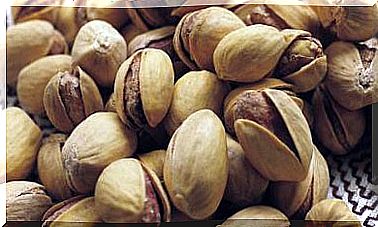How To Eat To Have An Awake And Focused Mind
In order for the brain to perform its functions effectively, in addition to not being exposed to toxic substances, it needs to have a regular supply of energy and certain nutrients.

We live in a society that demands from us, day after day, a great intellectual effort. There are many mental challenges that we have to face today to be efficient at work or in school. In a very remote past, primitive man had to use very fine senses and a good physical condition to perform in the struggle for life; muscles and manual dexterity were vital to survival.
Since then, things have changed a lot and today the success in the task of earning a living usually rests, almost exclusively, in that complex network of neurons that we call the brain. An organ that, in many respects, remains a mystery to science.
The consequence is that there are more and more people with mental performance problems, which is reflected in symptoms such as lack of concentration, small memory lapses, nervousness, anxiety or difficulty sleeping.
Brain plasticity
The good news is that the brain, like any other organ, can significantly improve its function and performance if we provide it with good nutrition as well as adequate activity.
The most recent research on the relationship between diet and neuronal problems has revealed a surprising fact: almost insignificant deficiencies of certain nutrients, such as boron, vitamin B2 or iron, can lead to significant losses in the brain performance.
This means that by improving the diet and taking certain supplements it is possible to correct disorders that for a long time were only considered treatable with drugs or from the field of psychiatry. On the other hand, it is possible to increase the IQ at any age not only with mental exercises but through food.
As early as the 1960s, Dr. Albert L. Kubala demonstrated, in a study with a large group of students, that those with a higher level of vitamin C in their blood scored better on intelligence tests.
If a single vitamin is capable of inducing a multi-point increase in mental performance, imagine what can be achieved if we ensure that we supply the optimal amino acids, antioxidants and nutrients for the body to manufacture the neurotransmitters responsible for cognitive processes .
A well-nourished brain helps you feel happier and more capable, have sharper memories, and be more alert and alert. In addition, you have greater resistance to mental fatigue and it is easier to relax and sleep.
The relevance of fats
The first slogan that can serve as a guide is that what is good for the heart is good for the brain. An excess of saturated fat in the diet is a major risk factor in cardiovascular disorders and, for the same reasons, is detrimental to the brain.
The omega-3 fatty acids, characteristic of fish blue, are vital for brain health because they constitute the raw material to produce prostaglandins, substances that regulate the release and activity of His neurotransmitters consumption is advisable even during exams.
On the other hand, phospholipids (abundant in egg yolk or lecithin) help make the myelin that lines nerve cells. It has been shown that excess omega-6 fatty acids and trans fats, usually in a diet rich in corn or sunflower oils and margarines, is associated with an increased risk of brain damage.
Energy without ups and downs
The most important nutrient for the brain is glucose, which is obtained essentially from foods rich in carbohydrates. In a normal day of activity, the brain consumes between 20 and 30% of the total energy ingested. But even more important than quantity is that brain neurons have a regular flow of fuel.
The moment a drop in blood glucose level is registered, symptoms such as dizziness, loss of memory and concentration, or emotional problems such as irritability may appear.
To keep supply levels constant and avoid neuronal damage caused by hunger of brain cells, it is necessary that the diet has a good supply of whole grains, fruit (especially apple), legumes such as lentils, beans or chickpeas and vegetables usually.
These foods, in addition to being a good source of carbohydrates, have a low glycemic index, which means that they are assimilated slowly, sending glucose to the blood constantly and progressively. On the contrary, products such as refined sugar or sucrose, maltose, soft drinks or white bread cause an insulin rush that favors energy and mood swings.
In general, the more processed, refined, and ground a food is, the higher its glycemic index. One reason is that plant fiber, especially insoluble fiber, slows down the absorption of glucose in the small intestine.
Another way to avoid blood glucose spikes is to start the day with a well-nourished and balanced breakfast, and if necessary, have a light snack, such as an apple, mid-morning.
Proteins and neurotransmitters
But if “good” fats provide vital substances and carbohydrates are the fuel, amino acids are the building blocks of neurotransmitters, which become the brain’s messengers, because they allow information to jump from one neuron to another. another across synapses. One of the most active and studied neurotransmitters is serotonin, which is synthesized from the essential amino acid tryptophan.
When serotonin is abundant in the brain, the person feels more confident and relaxed; in fact, drugs such as prozac or plants such as St. John’s wort work by keeping serotonin levels above normal.
Another amino acid object of numerous investigations is tyrosine ; Although it is not an essential amino acid, it is one of the most active in brain health, since the neurotransmitters dopamine, norepinephrine and adrenaline depend on it .
The presence of these neurotransmitters in neurons helps to avoid feeling overwhelmed when tasks accumulate and to maintain the level of performance under stressful situations. Therefore, to enjoy an active and fit brain, your diet must also include foods rich in protein.
Remember that the body does not use all proteins equally. Good sources of protein are soybeans, tofu, and microalgae. Also legumes, nuts and cereals.
Essential vitamins and minerals
All the vitamins of group B have a direct participation, and in many cases essential, in the development and vitality of the neurons. A good part of the importance of these nutrients is that, since they are water-soluble vitamins, the body does not store most of them and therefore needs to receive them regularly through food.
Vitamins B3, B6, B12 and folic acid (B9) work together in a metabolic process that is crucial in the formation of neurotransmitters. The deficiency of any of these vitamins can break that synergy, and is often associated with states of nervousness and low mood.
Another water-soluble vitamin that can be provided regularly is vitamin C, the importance of which is obvious considering that its concentration in the brain is up to 15 times higher than in the rest of the body. Besides being a great antioxidant, it improves cerebral circulation.
Among the brain-friendly minerals , magnesium and calcium stand out, a pair of nutrients that must be balanced for each to adequately fulfill its functions. Foods rich in these minerals help relax the nervous system and fight insomnia by reducing emotional hyperactivity. Zinc is depleted faster in periods of stress, and its deficiency is associated with problems such as anxiety, depression or even autism.
Protective substances
The brain is very sensitive to toxic substances, such as heavy metals and many chemicals used by agriculture (pesticides, herbicides), hence it is vitally important to give preference, as far as possible, to organic food.
Alginic acid from algae, as well as pectin from apples or citrus peel, help to eliminate heavy metals and protect neurons. It is also advisable to avoid highly processed foods that contain food additives, as well as increase the proportion of fresh products.
Being a fatty organ, the brain is very sensitive to the attack of free radicals, which cause its aging. Do not forget that metabolizing calories in turn generates free radicals, so moderation at the table is another way to preserve brain health.
To avoid this damage we need the protection of antioxidants, capable of reducing the oxidation of nerve cells. Many nutrients serve this function – such as vitamins A, C and E or selenium – but it is also useful to turn to other powerful antioxidants such as flavonoids and anthocyanins.
These substances are pigments that are especially abundant in wild berries (blackberries, blueberries …), grapes, pomegranates or cherries, and in the skin and the outermost layers of fruits and vegetables.
The use of these antioxidants is maximum if the fruit is consumed unpeeled, another good reason to prefer it organically grown.
Brain friendly foods
We conclude by highlighting a series of healthy foods for the body in general and for the brain in particular:
1. Quinoa
Its interest lies mainly in the fact that it is one of the few plant sources that has all the essential amino acids, which favors their assimilation and the manufacture of neurotransmitters, together with most of the B group vitamins. It has a low glycemic index and it is rich in magnesium, phosphorus and iron.
2. Walnut
It is a great brain food, because it is the only nut rich in omega-3 fatty acids, which help lower blood cholesterol and improve circulation. It helps raise dopamine levels, which improves mood, and is a good source of polyphenols that act as antioxidants.
3. Avocado
It is one of the most complete foods in the plant world. Its vitamin E helps protect the fatty tissue of the brain, and its richness in folic acid makes it an ally to reduce homocysteine, an amino acid whose excess is toxic to the nervous system (see box on the left). Its fats are essentially monounsaturated, like those of olive oil.
4. Apple
It is one of the foods with the most pectin, a type of fiber that contributes to the elimination of mercury, lead and cadmium, metals that are toxic to neurons. It is also a good source of fructose and glucose, the fuel for the brain, which pectin itself helps to assimilate progressively. The glutamic acid in this fruit stimulates neuronal connections.
5. Sesame
This seed is rich in polyunsaturated fatty acids, as well as minerals essential for mental performance such as calcium, magnesium and phosphorus. It is a great protector of the brain thanks to vitamin E, but, above all, a source of lecithin, a phospholipid that plays an important role in boosting memory.
6. Granada
Its abundance in flavonoids, tannins and vitamins makes it one of the best antioxidants that exist, superior to black grapes and green tea. It provides easily assimilable iron thanks to the presence of vitamin C. There are studies that show that the polyphenols of this fruit, consumed by pregnant mothers, protect the fetus’ brain against possible ischemic injuries after premature birth.









